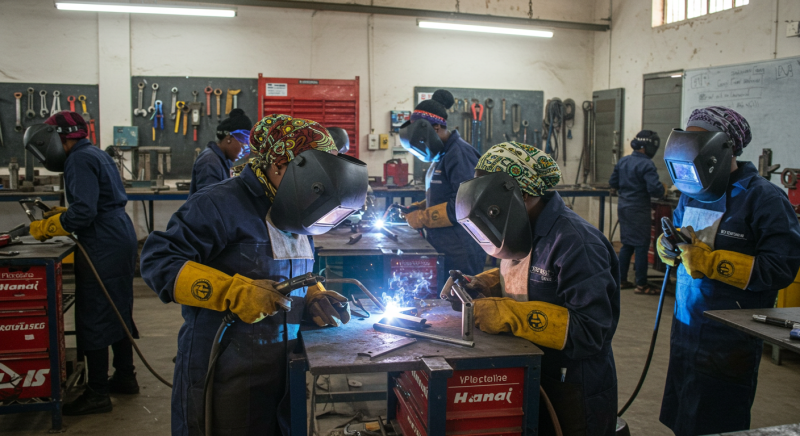A Nation at a Crossroads
“In a country where 63% of the population is under 25, yet 33.3% of youths are unemployed, vocational training isn’t just an option—it’s a survival strategy.”
Nigeria’s unemployment crisis is a paradox of potential. With abundant human capital but systemic mismatches between education and labor needs, vocational training emerges as a lifeline. This analysis synthesizes historical insights, policy gaps, and global best practices to propose actionable solutions.
Key Takeaways
- Historical Neglect: Vocational training traces back to pre-colonial apprenticeships but remains underfunded and stigmatized.
- Economic Catalyst: Vocational graduates contribute 48% to GDP through small businesses, reducing reliance on imports.
- Gender Empowerment: Women-led enterprises in tailoring and agribusiness thrive post-training, yet systemic barriers persist.
- Policy Gaps: Only 4% of Nigeria’s education budget supports vocational programs, hindering scalability.
- Global Lessons: Germany’s dual education system and Finland’s AI-integrated curricula offer models for Nigeria.
Historical Context: From Colonial Legacy to Modern Challenges
1. Pre-Colonial Foundations
Vocational training in Nigeria began with informal apprenticeships, where blacksmiths, weavers, and carpenters passed down skills through generational mentorship. These systems emphasized practicality but lacked formal structure.
Colonial Disruption:
British administrators introduced formal trade schools to produce laborers for colonial industries, sidelining indigenous knowledge. Post-independence, the 1977 National Policy on Education and the 6-3-3-4 system sought to integrate vocational training into secondary education but faced poor implementation.
Modern Reality:
Today, 60% of vocational centers use outdated curricula, and 72% lack industry-standard equipment. For example, electronics students often train on analog tools despite Nigeria’s shift to digital infrastructure.
Economic Impact: Beyond Unemployment Reduction
1. GDP Growth and Diversification
Vocational training diversifies Nigeria’s oil-dependent economy by empowering sectors like agriculture, renewable energy, and tech. For instance:
- Agribusiness: Training in food processing and irrigation reduces post-harvest losses, boosting Nigeria’s $100B agricultural potential.
- Tech Innovation: Coding bootcamps (e.g., Etiwa Tech-Google partnership) enable graduates to build apps solving local logistics challenges.
Statistic Spotlight:
- Skilled artisans save Nigeria ₦2.3 trillion annually by replacing foreign labor in construction.
- Vocational graduates are 3x more likely to start businesses than university peers.
2. Reducing Import Dependency
Nigeria spends $10B annually importing machinery, much of which breaks down due to environmental incompatibility. Vocational training equips local technicians to design context-specific tools, preserving foreign reserves.
Case Study:
The N-Power Tech program trains youths in robotics and AI, enabling them to repair and customize imported machinery for Nigeria’s humid climate .
Sociocultural Barriers: The Stigma of “Inferior” Education
1. Perception vs. Reality
Despite vocational graduates earning 5x more than many white-collar workers, 70% of Nigerian parents prioritize university degrees, viewing vocational careers as “last resorts” . This stigma stems from colonial-era policies that glorified clerical jobs over technical roles.
“My father disowned me when I chose a welding course over law school. Today, I employ 15 people and fund my siblings’ education.”
—Emeka, Abuja-based entrepreneur.
2. Gender Disparities
While women dominate tailoring and catering programs, they face limited access to male-dominated fields like robotics. The WAVE Academy reports that only 12% of its renewable energy trainees are female.
Policy and Structural Challenges
1. Chronic Underfunding
Nigeria allocates only 4% of its education budget to vocational training, compared to 15% in Ghana. This results in:
- Dilapidated workshops with obsolete equipment.
- Unpaid instructors earning less than $100/month.
2. Curriculum-Industry Mismatch
A 2023 NBTE study found that 68% of vocational syllabi omit digital skills like AI and data analytics, despite employer demand. For example, construction courses rarely cover 3D printing, now critical for affordable housing projects 9.
3. Fragmented Governance
Overlapping mandates between the NBTE, state agencies, and NGOs create bureaucratic delays. A 2024 World Bank report noted that vocational funds often stall at federal levels, never reaching grassroots centers.
Global Lessons and Local Innovations
1. Germany’s Dual System
Germany combines classroom learning with paid apprenticeships, ensuring 85% of vocational graduates secure jobs. Nigeria’s N-SKILLS Program mirrors this with stipends and internships but lacks scale.
2. Finland’s AI-Driven Training
Finland uses virtual reality to simulate welding and plumbing scenarios, reducing training costs by 40%. Nigerian startups like SkillNG are piloting similar VR labs in Lagos.
FAQs
Q: How does vocational training reduce crime rates?
A: By engaging youths in productive skills like carpentry and coding, vocational centers in Kano reported a 30% drop in gang recruitment.
Q: Can vocational graduates access higher education?
A: Yes! Polytechnics like Yaba Tech offer HND-to-degree pathways, with 25% of graduates pursuing engineering degrees .
Q: What sectors offer the highest salaries post-training?
A: Renewable energy technicians earn ₦350,000 monthly, while AI specialists command $1,500+ in freelance markets .
Recommendations for Systemic Change
- Triple Funding: Increase vocational budget allocations to 12% by 2030, prioritizing tech-enabled curricula
- Public-Private Partnerships: Incentivize companies like Dangote and MTN to sponsor training centers in exchange for tax breaks
- National Awareness Campaigns: Launch “SkillUP Nigeria” to rebrand vocational careers via social media and success stories
- Decentralize Governance: Empower local governments to manage vocational centers, ensuring faster resource allocation
Conclusion: A Call to Action
Nigeria’s future hinges on its ability to convert its youth bulge into a skilled workforce. As Amina’s catering business and Emeka’s welding enterprise prove, vocational training isn’t just about jobs—it’s about dignity, innovation, and national pride. Let’s build a Nigeria where “every hand is skilled, and every skill fuels progress.”
Sources: National Bureau of Statistics 9, World Bank Reports 12, NBTE Policy Briefs 11.
